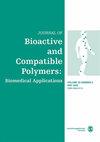万古霉素偶联壳聚糖/PEO纳米纤维支架具有良好的抗菌活性,具有潜在的生物医学应用前景
IF 2.1
4区 生物学
Q3 BIOTECHNOLOGY & APPLIED MICROBIOLOGY
引用次数: 0
摘要
本研究旨在评价万古霉素(VCM)与壳聚糖(CS)/聚乙烯氧化物(PEO)纳米纤维联合使用对可能发生的严重细菌感染(PSBI)的协同抗菌性能。采用静电纺丝法制备了VCM/CS纳米纤维支架。表征是通过傅里叶变换红外(FT-IR)来检查每个化合物的官能团,扫描电子显微镜(SEM)和瞬态电子显微镜(TEM)来评估纳米纤维的直径和结构。采用微稀释肉汤法测定纳米纤维支架对标准金黄色葡萄球菌(S. aureus)、vcm敏感肠球菌(VSE)、耐甲氧西林金黄色葡萄球菌(MRSA)、vcm耐药肠球菌(VRE)和A群链球菌的抑菌活性。FT-IR, SEM和TEM检测结果证实了CS/PEO纳米纤维支架的制备。抑菌试验结果显示,VCM与VCM/CS纳米纤维的最低抑菌浓度(MIC)值无显著差异。尽管如此,CS和VCM/CS纳米纤维在金黄色葡萄球菌中的MIC存在显著差异,但并不比VCM更显著。本研究表明,VCM偶联CS纳米纤维对革兰氏阳性菌具有良好的抑菌活性。这项工作促使研究人员深入了解纳米结构的潜力,以及抗菌聚合物和抗生素对PSBI的协同作用。本文章由计算机程序翻译,如有差异,请以英文原文为准。
Vancomycin coupled chitosan/PEO nanofibrous scaffold with the desired antibacterial activity as a potential for biomedical application
This study aims to evaluate the Vancomycin (VCM) combination with Chitosan (CS)/ Polyethylene oxide (PEO) nanofibers’ intrinsic antibacterial properties causing a synergistic effect against possible serious bacterial infections (PSBI). VCM/CS nanofiber scaffold was fabricated using the electrospinning method. Characterizations are performed by Fourier transform infrared (FT-IR) to examine the functional groups of each compound, scanning electron microscopy (SEM), and transient electron microscopy (TEM) to evaluate nanofiber diameter and structure. Antibacterial activities of the nanofibrous scaffold were assessed against bacterial strains, including standard Staphylococcus aureus ( S. aureus), VCM-sensitive Enterococcus (VSE), methicillin-resistant S. aureus (MRSA), VCM-resistant Enterococcus (VRE), and Streptococcus group A by microdilution broth methods. The FT-IR, SEM, and TEM examination results confirm the CS/PEO nanofiber scaffold fabrication. The antibacterial examination results showed no significant difference between the minimum inhibitory concentration (MIC) values of VCM and with MIC of VCM/CS nanofibers. Still, there were significant differences between the MIC of CS and VCM/CS nanofibers in S. aureus, but this is not more significant than VCM. This study illustrated that VCM coupled to CS nanofibers had acceptable antibacterial activity against the Gram-positive bacterium. This work motivated researchers’ insight into nanostructures’ potential accompanied by antibacterial polymer and antibiotics synergistic effects against PSBI.
求助全文
通过发布文献求助,成功后即可免费获取论文全文。
去求助
来源期刊

Journal of Bioactive and Compatible Polymers
工程技术-材料科学:生物材料
CiteScore
3.50
自引率
0.00%
发文量
27
审稿时长
2 months
期刊介绍:
The use and importance of biomedical polymers, especially in pharmacology, is growing rapidly. The Journal of Bioactive and Compatible Polymers is a fully peer-reviewed scholarly journal that provides biomedical polymer scientists and researchers with new information on important advances in this field. Examples of specific areas of interest to the journal include: polymeric drugs and drug design; polymeric functionalization and structures related to biological activity or compatibility; natural polymer modification to achieve specific biological activity or compatibility; enzyme modelling by polymers; membranes for biological use; liposome stabilization and cell modeling. This journal is a member of the Committee on Publication Ethics (COPE).
 求助内容:
求助内容: 应助结果提醒方式:
应助结果提醒方式:


